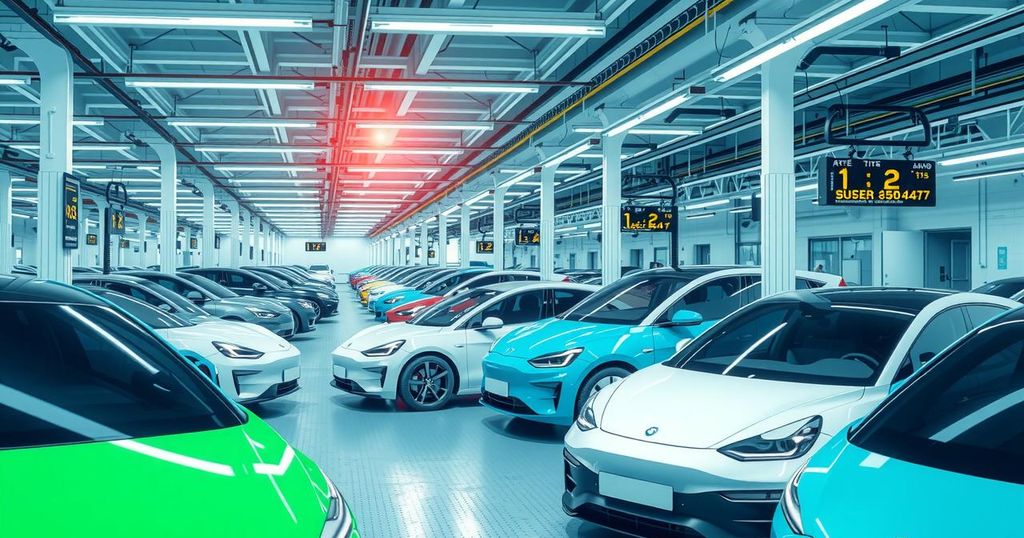Dodai: Revolutionizing Ethiopia’s Electric Vehicle Market Through Innovation

Dodai has quickly become Ethiopia’s fastest-growing EV maker by specializing in battery-powered motorcycles that are popular among businesses. Significant government partnerships aim to enhance infrastructure, including a network of battery swapping stations. Dodai’s strategic use of superior battery technology sets it apart in a competitive landscape. The company continues to navigate regulatory challenges while preparing for expansive growth in the electric vehicle market.
In Ethiopia, where less than half the population has access to electricity, the local startup Dodai has emerged as the nation’s fastest-growing electric vehicle manufacturer within just a year of its launch. The company’s innovative battery-powered motorcycles have become a key mode of transport for businesses, providing a range of 150 kilometers (93 miles) on a single charge, thereby addressing the needs of delivery services despite the existing regulatory and supply-chain obstacles.
Dodai’s success has attracted attention from the government, particularly the Ethiopian Investment Holdings, which aims to establish a network of 300 battery swapping stations over the next three years. This infrastructure aims to facilitate quick battery exchanges for electric vehicles, addressing the challenges of unstable electricity and limited charging points in the country.
Founded in 2022 by Japanese entrepreneur Yuma Sasaki, Dodai has gained popularity among local businesses, such as the Sheger wedding store in Addis Ababa, which saved significantly on fuel and maintenance by switching to Dodai’s electric bikes. The store’s owner noted, “We charge the bikes at our store and give a better service to our client at no fuel cost and low maintenance cost.”
Priced at $1,800 each—approximately $500 more than competitors—Dodai targets both small and large businesses. In 2023, the Ethiopian Postal Service entered an exclusive partnership with Dodai, serving as its largest customer before the public launch. The company’s competitive edge lies in its use of lithium-ion batteries compared to competitors offering lead-acid batteries.
Dodai’s growth strategy is multifaceted, involving partnerships with GPS service providers like Beatrix to aid in navigating the cumbersome registration process, often slowed by local regulations. By investing in tracking systems, Dodai can assist customers in obtaining license plates more efficiently, sometimes reducing the registration time from six months to two. Sasaki stated, “We have a 100% share of EV bikes with number plates since all other EV bike sellers can’t give enough support to customers to get number plates.”
Despite these strategies, the company faces ongoing regulatory and supply chain challenges that limit growth potential, with Sasaki estimating that a more stable environment could have allowed for the sale of up to 5,000 bikes. The battery swapping model, which enables instant battery exchanges, promises to mitigate some of these issues. Experts believe that partnerships with government entities will help alleviate some regulatory hurdles.
Through the partnership with Ethiopian Investment Holdings, Dodai plans to operate swapping stations while the government will provide the necessary power supply. This approach allows riders a more financially feasible option, as they can pay per use instead of upfront costs for batteries. Sasaki emphasized the importance of this model in establishing a strong market position against competitors such as Yadea and Transsion.
The company has secured $7 million in funding, primarily from Japanese investors, and aims to raise an additional $10 million to further develop the battery swapping initiative. Sasaki recognizes the critical implications of long-term investment in Africa’s volatile regulatory environment. He remarked, “In Africa, regulation change, political stability, supply chain infrastructure are issues. Unless you are a long-term investor, you won’t be happy.”
As Dodai prepares to launch the initial 100 battery swapping stations, it also plans to offer its fixed battery model. Sasaki anticipates market segmentation, with delivery services likely to prefer battery swapping and commuters opting for fixed batteries, thereby allowing Dodai to cater flexibly to customer preferences and market dynamics.
In summary, Dodai exemplifies innovation in Ethiopia’s electric vehicle sector through its focus on battery-powered motorcycles tailored for business needs. By addressing regulatory obstacles and supply chain challenges, the company has successfully partnered with government entities to facilitate growth. The introduction of battery swapping stations may revolutionize accessibility to EVs in the country and facilitate further expansion for Dodai in an evolving market.
Original Source: restofworld.org




